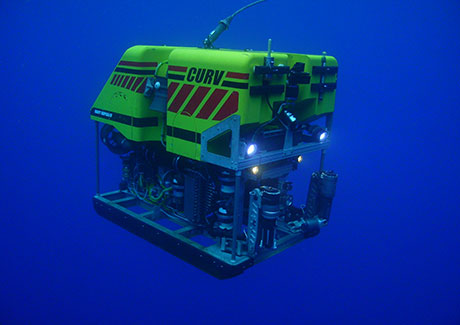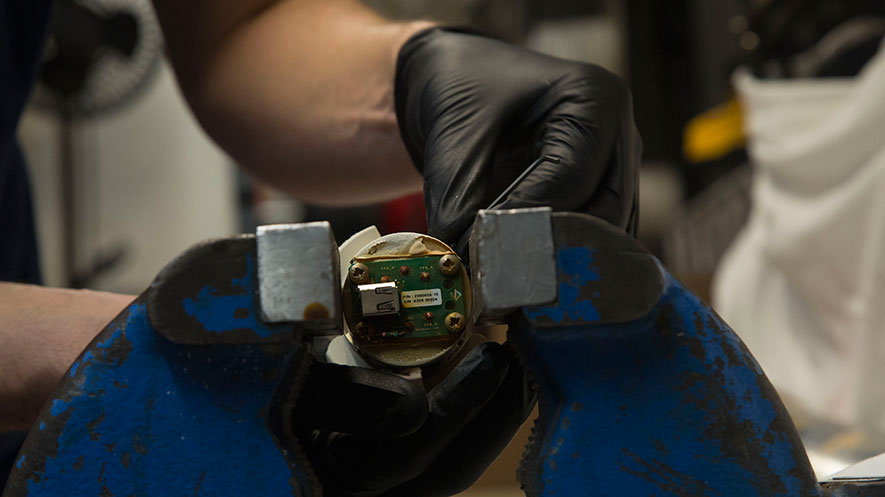Phoenix International Holdings, Inc. (Phoenix), under the operational direction of the U.S. Navy’s Office of the Supervisor of Salvage and Diving (SUPSALV), successfully recovered the voyage data recorder (VDR) from the sunken cargo vessel El Faro.
The recovery of the capsule caps a 10-month-long, multi-agency effort to retrieve the recorder, which was designed to record navigational data and communications between crewmembers on the ship’s bridge. Investigators hope the recorder will reveal information about the final hours of El Faro’s voyage and the circumstances leading up to the sinking.
The third mission to the El Faro began Aug. 5, 2016, and the vessel arrived on scene August 8, and later that same evening the El Faro’s voyage data recorder was safely brought aboard the USNS Apache by the Navy’s CURV-21 remotely operated vehicle, operated by Phoenix International.
Working aboard USNS Apache (T-ATF 172), Phoenix operated the U.S. Navy’s Remotely Operated Vehicle (ROV) CURV-21during a single 13 hour dive to identify and recover the VDR from a water depth of 15,000 feet. The VDR was placed in fresh water to help prevent corrosion of the electronic components. U.S. Coast Guard and National Transportation Safety Board (NTSB) personnel decided to disassemble and visually examine the VDR while at sea to gain a better understanding of the condition of the memory unit and to identify what steps are needed to recover the data. All of the components of the El Faro’s VDR were transported to the NTSB’s laboratory in Washington, DC, Aug. 12, 2016.
“We hope this recovery leads investigators to identify the cause of the sinking and prevent future similar tragedies” says Mike Kutzleb, President of Phoenix.
 Phoenix operated the U.S. Navy’s Remotely Operated Vehicle (ROV) CURV-21during a 13 hour dive to recover the VDR from a depth of 15,000 feet.
Phoenix operated the U.S. Navy’s Remotely Operated Vehicle (ROV) CURV-21during a 13 hour dive to recover the VDR from a depth of 15,000 feet.
El Faro went missing on October 1, 2015 while operating in the midst of Hurricane Joaquin near Crooked Island in the Bahamas. In late October 2015, Phoenix, under the direction of SUPSALV, successfully located the sunken ship using the U.S. Navy’s deepwater side scan sonar search system Orion. The Phoenix team then launched CURV-21 to verify and visually inspect the wreckage.
The examination of the data that may be contained on the El Faro’s data recorder is set to begin Monday, Aug. 15, 2016. The examination, called an audition, will happen in two rounds. The initial round only includes the NTSB Office of Marine Safety Acting Director, the NTSB Research and Engineering Director, the NTSB’s Investigator in Charge, and the U.S. Coast Guard’s Chief of Investigations and Casualty Analysis. This audition is of the raw audio without any clean up or filtering and helps to determine the future scope of work.
From the first audition, the NTSB Research and Engineering team will produce a general characterization of the data that details the number of hours, quality of data, quality of audio, presence of GPS, radar, and any other data captured.
The NTSB’s next step is to convene the VDR investigative group. Much like the other groups within the investigation, this group may consist of a member of each of the parties - NTSB, U.S. Coast Guard, American Bureau of Shipping and TOTE Services. These parties are requested to participate as subject matter experts because they can provide expertise in analyzing the VDR information and creating a transcript.
The NTSB forbids lawyers, company executives, or media representatives from participating as members of the VDR investigative group. Group members must sign a strict non-disclosure agreement that prohibits them from releasing any information from the audition to their organizations or to anyone outside of the VDR group. Because the VDR audition happens within the NTSB investigation party process, it is not considered a public disclosure.
The NTSB is prohibited by federal law from publicly releasing any audio captured from a VDR. Even within the agency, and the team working on the investigation, there are strict limitations on who is able to listen to the audio.
The VDR group will work together to create a transcript of any audio recovered from the VDR. The transcript will be used to inform the future activities related to the El Faro investigation, and any part of the transcript that is considered relevant to the investigation will be released in the public docket. The NTSB will not publicly release the audio at any time. For more information, click here.





